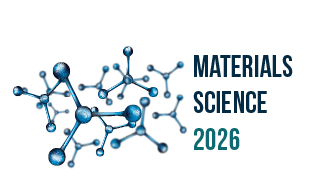3rd Global Event on
Materials Science and Engineering
October 29-30, 2026 | Berlin, Germany

Materials Science 2026

Catholic University of Brasilia, Brazil
Abstract:
This talk will focus on the description of surface functionalized
ultrafine CoFe2O4 nanoparticles (NPs), with mean diameter
~ 5 nm. The investigated properties include DC magnetization and AC
susceptibility measurements over the temperature range of 4 – 400 K. All
evaluated NPs present the same CoFe2O4 core, with
different molecular surface coatings, increasing gradually the number of carbon
atoms in the coating layer, in the following list: glycine (C2H5NO2),
alanine (C3H7NO2), aminobutanoic acid (C4H9NO2),
aminohexanoic acid (C6H13NO2), and
aminododecanoic acid (C12H25NO2). Importantly,
samples were intentionally fabricated in order to modulate the core-core
magnetic dipolar interaction, as the thickness of the coating layer increases
with the number of carbon atoms in the coating molecule. The magnetic data of
the uncoated CoFe2O4 NPs it is also presented for
comparison. All investigated CoFe2O4 NPs (coated and
uncoated) are in magnetically blocked state at room temperature as evidenced by
ZFC/FC measurements and the presence of hysteresis with ~700 Oe coercivity. Low
temperature magnetization scans show slightly constricted hysteresis loops with
coercivity decreasing systematically while the number of carbon atoms in the
coating molecule decreases, possibly resulting from differences in magnetic
dipole coupling between NPs. Large thermomagnetic irreversibility, slow
monotonic increase in the FC magnetization and non-saturation of the
magnetization give evidence for the cluster glass (CG) nature in the CoFe2O4
NPs. The out of phase part (c″) of AC susceptibility for
all samples shows a clear frequency dependent hump which is analyzed to
distinguish superparamagnetic (SPM), cluster glass (CG) and spin glass (SG)
behavior by using Néel-Arrhennius, Vogel-Fulcher, and power law fittings.
Biography:
Paulo C. DE MORAIS, PhD, was full Professor of Physics at the University of Brasilia (UnB) – Brazil up to 2013, Appointed as UnB’s Emeritus Professor (2014), Appointed as Guest Professor of Huazhong University of Science and Technology – China (2011), Visiting Professor at Huazhong University of Science and Technology (HUST) – China (2012-2015), Appointed as Distinguished Professor at Anhui University (AHU) – China (2016-2019), Appointed as Full Professor at Catholic University of Brasília (UCB) – Brazil (2018), Appointed as CNPq-1A Research Fellowship since 2010. 2007 Master Research Prize from UnB, 2008-member of the European ERA NET Nanoscience Committee, Member of the IEEE-Magnetic Society Technical Committee, Senior Member of the IEEE Society, 2012 China’s 1000 Foreign Expert Recipient, and 2012 Academic Excellence Award from Brazilian Professor’s Union. He held two-years (1987-1988) post-doc position with Bell Communications Research – New Jersey, USA and received his Doctoral degree in Solid State Physics (1986) from the Federal University of Minas Gerais – Brazil. He graduated in both Chemistry (1976) and Physics (1977) at UnB. Professor Morais is member of the Brazilian Physical Society and the Institute of Electrical and Electronics Engineers – IEEE. He has served as referee for more than 50 technical journals, takes part of the Editorial Board of more than 15 technical journals and has conducted research on nanomaterials for over 40 years. He has delivered 170 Invited Talks all over the World. He is known for his research in preparation, characterization and applications of nanosized materials (magnetic fluid, magnetoliposome, magnetic nanoemulsion, magnetic nanocapsule, magnetic nanofilm, magnetic nanocomposite, nanosized semiconductors, polymeric dots, carbon dots, and graphene quantum dots). With nearly 500 published papers in peer reviewed journals, more than 12,500 citations and 16 patents, he has appeared in recent World ranking of top scientists, such as 2020-Stanford, 2022-Research.com, 2023-AD Scientific Index, and 2023-Research.com.
